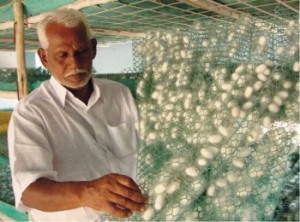
“Today large numbers of educated rural youth are migrating to cities in search of work, as agriculture has not been remunerative.
“Though there are several reasons for loss and failure in agriculture, proper guidance and right decisions taken at the correct time prevents losses, and at the same time generates thousands of rupees as income, besides providing employment to several others,” says Dr. R. Balakrishna, Head, Regional Sericultural Research Station, Allikkuttai (Post), Salem.
Income generation
Income generation is the only way to retain youth in agriculture and today sericulture promises to offer monthly income on par with salaries drawn from private jobs based on the entrepreneurs’ interest and work, according to Mr. N. Sakthivel, Head, Research Extension Centre, Central Silk Board, Srivilliputtur, Tamil Nadu.
Sericulture falls into two sections: one, cultivation and maintenance of mulberry plants, the food plant of silkworm; and two, rearing of silkworms on 4-5 tier rack in a well ventilated rearing shed by feeding them mulberry leaves.
Advanced technologies
Advanced technologies for mulberry cultivation and user friendly, cost-effective silkworm rearing technologies are being introduced by the Central Silk Board for farmers.
These new techniques do not involve drudgery, require low investment, and promise good income.
“After establishing a mulberry garden and rearing shed, one can take up sericulture for years together.
Professionals
Many graduates, post-graduates, even engineers and doctors especially in Erode, Coimbatore, Dharmapuri, and Krishnagiri districts are practicing sericulture on a large scale,” says Mr. Sakthivel.
Says Mr. R. Navaneethan a successful sericulture farmer from Srivilliputtur, Tamil Nadu:
“I am earning a monthly income of more than Rs. 45,000 from this vocation.
After completing my post graduation I got a number of employment opportunities. But family responsibilities required me to maintain my ancestral lands (15 acres) and I undertook cotton trading for nearly 20 years, and faced repeated losses.
The low profit from my lands forced me to cut short even my essential expenditure such as my childrens’ educational expenses,” recalls Mr. Navaneethan.
During 2003 the Department of Sericulture, Government of Tamil Nadu encouraged farmers to take up agro based business in villages for generating assured monthly incomes.
“The intensive support from the department,” says Mr. Navaneethan, helped him to establish the required infrastructure easily.
Investment
“I planted a high yielding mulberry variety and constructed a silkworm rearing house for rearing 500 silkworm egg masses at a time. I invested about Rs. 4.5 lakh and claimed some subsidy from the department.
“Initially I reared conventional silkworm breeds but later switched over to international breeds that fetch higher incomes,” he explains.
The farmer adopts advanced technologies such as stem cutting machine for pruning the mulberry garden, drip irrigation, mulching for weed management to cut short labour requirements. He now harvests about 325 kg of cocoons per batch and earns a monthly profit of Rs.47, 500 and an annual net profit of Rs. 5, 70,000.
“Providing recommended inputs to mulberry plants to produce quality leaves, proper disinfection measures, and maintenance of a hygienic and cool rearing environment even in summer are the secret of Mr. Navaneethans’ success in the field says,” Mr. Sakthivel.
No retirement
“Many of my friends working in private and government jobs are going to be retire by next year, but I am planning to extend mulberry cultivation by four acres and construct one more rearing house to double my income,” smiles Mr. Navaneethan.
According to him, the adequate monetary benefit and extensive technical support of the research center in Srivilliputtur created enthusiasm to expand his business as large scale industry.
“The Central Silk Board and the State Sericulture Departments are providing extensive support to start sericulture, provide training and extend technical support for those interested in pursuing this line,” says Dr. Balakrishna.
For further details contact Mr. Navaneethan, A. Ramalingapuram village, Achanthavilthan (Post), Srivilliputtur, Virudunagar, Tamil Nadu, mobile: 9487402903 and regional sericultural research station at email: rsrsslm@gmail.com, Phone: 0427-2296374.

